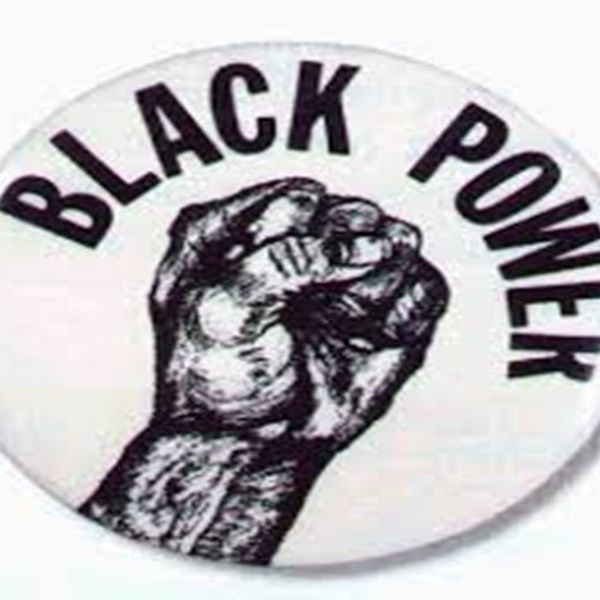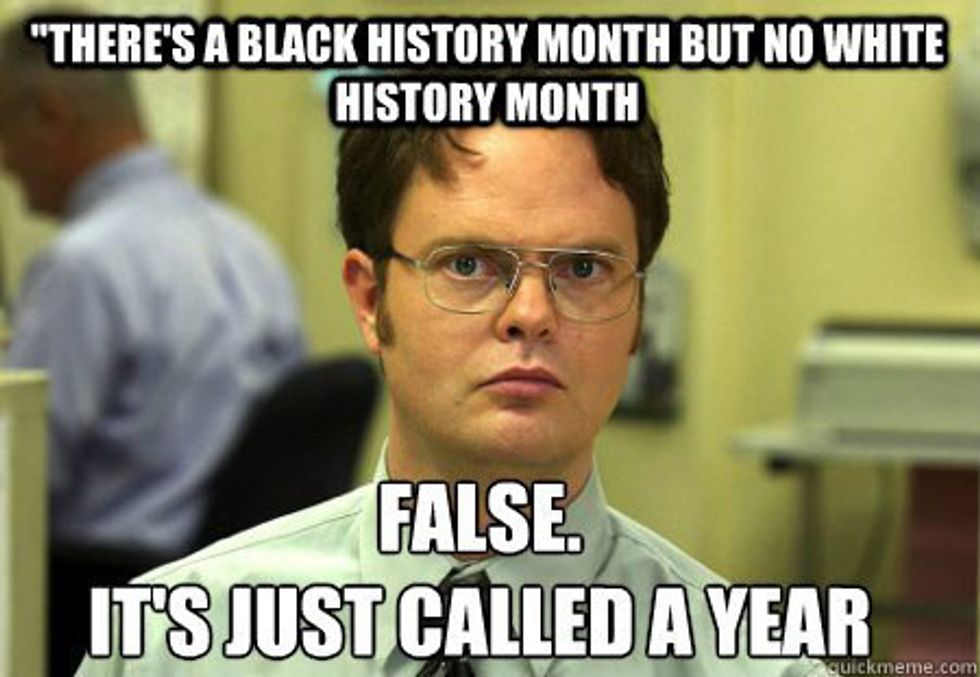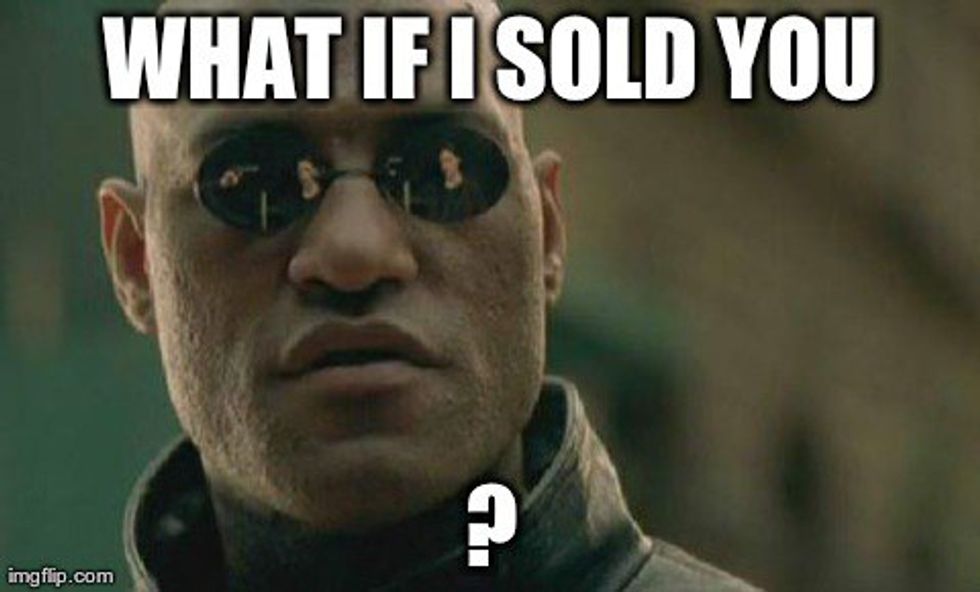As February quickly approaches and society distracts itself with true love, millionaire athletes and the most successful Hollywood stars, there is one more thing that will be on everyone’s mind--maybe. Black History Month is one of the few American calendar institutions that does not resonate nationwide.
I remember a time when Black History Month was more of a catchy slogan than an actual recognized “event.” Although I went to schools that were predominantly black before college, there was never a school that celebrated Black History Month the “right way,” deeming how it should be acknowledged.
It is, in fact, the off-handed approach to this time that was once considered a monumental achievement in the black community that causes people today to ask, “Why even have Black History month?” The most notable of these people is Stacey Dash (former BET supporter and person who once lived on black checks).
I was a little more than surprised to hear her arguments against this time of year as well as hearing the totally unbiased Fox News reporter guide her into a flurry of nonsensical arguments. Although my mind became clouded with a mixture of anger and confusion, I decided to listen to what she had to say, in the hopes of developing an argument against it, knowing that she is just one of many who take these “truths” to be Gospel.
She essentially believes that since there is no “White History Month” then there should be no Black History Month. I was unsure how to combat this statement at first, or rather, of the many ways there were to combat it, which was the most efficient. In the end, I decided that there were three main flaws with this line of argumentation.
First, we must consider the authors of history before we jump to the conclusion that history has no color. Whether it is Black History Month or the overarching theme of history, the only ones who can actually communicate history are the victors. In the case of American history, this would obviously be white people.
In order to come to the conclusion that there is no white history, you must first assume that history is unbiased. This is obviously not true in a world where most textbooks that are used to teach poor black and brown individuals in middle school and high school are full of the glorious revolutions that existed in white western society. In fact, as a middle school student I remember believing that the success of black individuals always hinged on white people.
There were times when I would unconditionally accept history to be non-falsifiable, that even though I was told otherwise, I believed that Eli Whitney single-handedly invented the cotton gin, Abraham Lincoln actually was an honest man without slaves, and that the Bloods and Crips actually rose to terrorize the black community and sell poison to children in the hood.
While I now know that none of these things are “fact,” there was no way that I could have come to that conclusion without an understanding of history that transcends what is taught in school, ergo, “Black History” might actually be necessary.
When developing what I thought would be a monumental argument that could be unbeatable, I realized that people who desire a White History Month might not care about the fact that every month is white history month in America, so I turned to a different line of reasoning.
I came to the conclusion that in order to get a “White History Month,” white people would have to go through layers and layers of oppression and subservience. The first layer is that white people need to go through a process of centuries of enslavement. This involves more than just free labor and whipping.
Although there were white American slaves, the idea of “chattel slavery” has never applied to western white folk. In order to get the full experience of slavery, you must traverse the perilous waters of the Atlantic, stripped of identity, culture, dignity and family, with nothing left to live for but life itself.
Then, upon arrival, you must take on the language of your masters and teach your children to live in a way that is akin to Stockholm syndrome, where the very essence of the master becomes that which is to be praised. The single, most important thing that must then occur is the denial of access to knowledge – no books, writing and especially no schooling.
After having survived this torturous existence where your new family members have both literally and metaphorically been ripped apart limb from limb, you must then engage in a civil rights movement post freedom (if you ever get freedom) and fight for basic American liberties.
The right to freely travel without restraint by law, the right of suffrage, and the right to be educated at top universities being all so far away means that before you can even get to a month filled with history about your people, you must have the power to influence this change.
So if you weren’t ready to be beaten mercilessly by police for peacefully protesting, be lynched and have your houses and churches torched by white terrorist organizations, and have thirteen year olds call you boy when you’re actually in your thirties, then there is no way you would be ready for a Black History Month.
But even if you could survive “phase two” of operation: White History Month, you still need to get through the third and final phase, pacification disguised as reform. Knowing now that your very existence threatens the norms of society, society will find a way to get rid of you. Now that you can vote, mandatory literacy tests will be given to all voters including you.
But wait, how could you complete a literacy test if you just went through phase one, which included restrictions on reading and writing, and phase two, which denied you access to better forms of education? The answer is simple, you can’t!
But let’s suppose you slip through the cracks and are able to vote despite these targeted restrictions, what’s next? Mass incarceration! Convicted felons are not allowed to vote, and since it is completely under the discretion of police and juries who are clearly against you and your people, there is no way you’ll make it out of the courtroom without a felony for a crime you did not commit.
Even if you were able to survive mass incarceration, you would have to survive the government’s plans to distribute drugs into your community, causing massive amounts of violence within the community, hyper-militarized policing and disproportionate poverty.
But all of these things are not “news,” they are things that have been planned for years. Even Lee Atwater, former “advisor” to Republican elected officials and candidates, describes the ways in which racism can be kept alive through abstract legislation rather than blatant attacks on black people.
So after you have successfully traversed these events, you will be ready for a white history month.
After developing these two arguments, my third argument as to why there is a need for a Black History Month and not a white history month became very simple you don’t actually want a White History Month. The events that would have to occur are filled with pain and oppression, and the things we would learn about white Americans are things that are better left secret.
These range from the COINTELPRO destruction of black leaders, to the police state and its involvement in the distribution of crack or “ready rock” into the black community with malicious intent. Let’s just say, black people wouldn’t mind if there was a real White History Month as much as people would seem to think.























